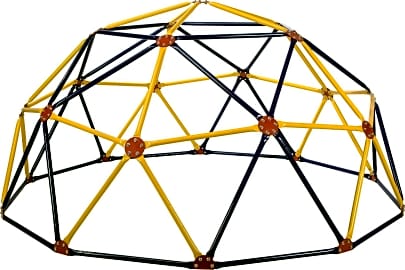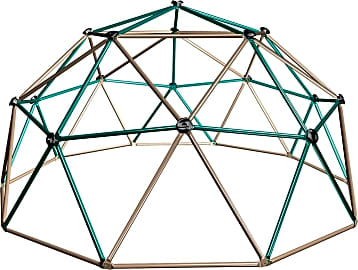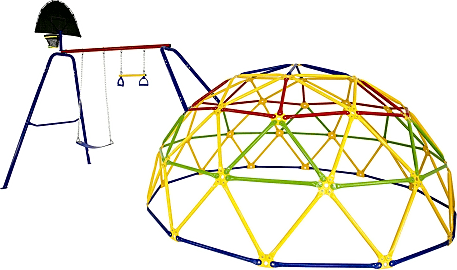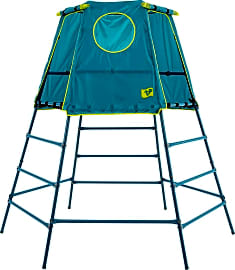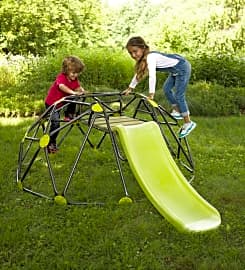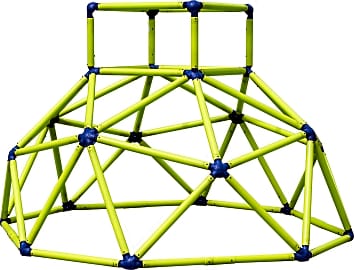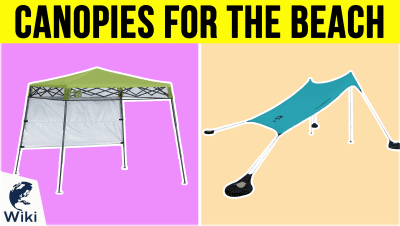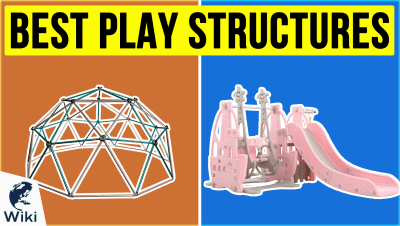The 8 Best Dome Climbers

This wiki has been updated 41 times since it was first published in June of 2015. Be warned: whether you want it to or not, installing one of these dome climbers in your backyard might turn your home into the go-to play destination for all the neighborhood kids. The little ones will have so much fun, they won't even realize that they're improving their fitness, balance, strength, and agility while they play. Just make sure they're under constant adult supervision. When users buy our independently chosen editorial selections, we may earn commissions to help fund the Wiki.
Editor's Notes
May 12, 2021:
We removed the Step2 Skyward Summit – which we felt was a nifty little structure, but not quite a fit for this category – and eliminated the Zupapa Outdoor Geometric due to availability issues.
We also replaced the TP Toys Explorer with the TP Toys Explorer 2, which looks a lot like the original model, only dressed up in a green powder coating that might help it cope with weathering, and therefore improve its longevity.
We added the SlideWhizzer Structure to our list, for the benefit of anybody who’s thinking that they would be interested in the HearthSong Slide if only it was a little bigger. While HearthSong’s offering has a four-foot slide and 5-1/2-foot diameter, the SlideWhizzer option has a six-foot slide and seven-foot diameter.
Our last new addition was the Jugader Upgraded, which caught our eye with its 800-pound weight capacity, handily doubling the upper limit of many of its competitors. We also thought the included tarp – which can either serve as a canopy or a hammock – was a pretty cool feature, and its included swing is a nice touch, although it could also be reasonably useless if you already have a serviceable swing set set up.
If you’re interested in other ways to help facilitate some fresh-air fun for your kids, then you might also be interested in checking out our rankings for play structures, kid picnic tables and outdoor toys for kids.
February 27, 2020:
While the models included on our previous list were sound investments, particularly the Easy Outdoor Space with its fine balance of size, ease of assembly, and durability, we still wanted to expand the ranking without adding too many of the suspiciously brand-less offerings you'll see around the web. To that end, we included the Eezy Peezy Monkey Tower and the Zupapa Upgraded Outdoor Geometric. Now, the Monkey Tower admittedly might seem to lack the weight capacity of other models, but this is merely because it's designed for a younger set of kids, right down to its limited height. Of course, some kids who might be too old or too large for this model may disregard your warnings about playing on it and could get themselves hurt, so be cognizant of that when evaluating this and other offerings.
And if you're intent on eventually getting your kids a much bigger playset, but might not have the money or space for a behemoth at the moment, the ActivPlay Geo might be a smart bet. Just keep in mind that its swingset extensively increases its footprint, so if space is the thing keeping you from investing in something like a Rainbow or Backyard Discovery brand set, you might want to find something a little smaller.
And as always, when your kids are playing on or around these sets, keep an eye on them. There are a lot of things that could go wrong here, and we want your kids to be safe, first and foremost.
Special Honors
FDomes But where are all the dome climbers for the adults? This company offers customizable, energy-efficient geodesic dome tents that will look stunning on the right glamping resort or vacation property. You may not think it's your thing right now, but a quick look through their portfolio might change your mind pretty quickly. fdomes.com
Bears Playgrounds When your kids outgrow their dome climber and you're ready to move on to something bigger and better, this family-owned, American company seems like one outfit worth checking out. They offer everything from small structures suitable for suburban backyards, to bigger behemoths that look like they'd be better off in a bona fide park. bearsplaygrounds.com
How To Choose a Reliable Dome Climber
Dome climbers come in a variety of sizes, and the larger a model is the more you want to be assured that the climber as a whole is sufficiently anchored.
Dome climbers come in a variety of sizes, and the larger a model is the more you want to be assured that the climber as a whole is sufficiently anchored. Certain climbers are built with poles or stakes around the base for this reason. Others are made from galvanized steel, which is not only unbreakable, but heavy enough that it forbids any sudden force from lifting, or tilting the entire mechanism off the ground.
Plastic dome climbers are generally smaller than their steel counterparts. As such, a plastic climber might give young children an opportunity to develop balance and motor skills before moving onto something that sits higher at its core. Along those lines, parents may want to veer toward a climber that either comes as one piece, or features interlocking segments. Any loose rails could represent a safety hazard, especially if kids are pressing down with all their weight.
Speaking of which, it pays to take note of a dome climber's weight capacity so you can get a sense of how many children should be on any climber at once. In addition, be sure to wipe down any dome climber after a heavy rain. As a precaution, you may also want to consider a dome climber that comes with hand grips or grip tape for ensuring that fingers and shoes won't slip off.
A Handful of Activities That Are Centered Around a Dome Climber
Used safely, a dome climber can be both developmental and fun. The structure of any climber lends itself to playing, sure, but there are also a variety of targeted activities that any parent can use to help his or her kids develop strength, dexterity, balance, and more.
Once you're done the biggest web of all should look like the dome climber itself.
The most common dome climber activity entails a young child learning to use his legs and arms to climb from one side of the dome to another. Once a child begins to gain some skill, he or she can compete against other children to see who can get across the transverse quicker. Of course, it should go without saying that every dome climber activity should be supervised by an adult. In the heat of competition, certain kids may become aggressive in an effort to win, or achieve a desired goal.
Two or more kids can play a game where they try to replicate one another's maneuvers on a dome climber (similar to the popular basketball game Horse). Maneuvers can be anything from hanging upside-down to straddling the center rail. Every time a player fails to replicate a maneuver, he or she receives a strike. Three strikes and a player is out. The game continues until there is a winner.
If you're trying to help a child build arm strength, you can have fun timing him or her to see how long he can hang from the center rail. As the child develops, you can spot him as he builds the strength to do a pull-up, or learns how to dangle while pulling his knees up (a popular ab exercise).
As an entertaining side activity, you and your kids can decorate a dome climber for Halloween. Just buy some rolls of cotton that you can pull apart to make the cotton look like spider webs. Spread the webs along the climber's rails, then hang several rubber spiders from the individual rails inside. Once you're done the biggest web of all should look like the dome climber itself.
A Brief History of The Dome Climber
The first jungle gym was invented in 1920 by a lawyer from Chicago named Sebastian Hinton, who at this point already formed a company named Junglegym. In his patent application, Hinton referenced the use of consecutive steel rails welded across parallel bars, thereby allowing people to climb and exercise using their "monkey instinct."
Dome climbers were particularly popular in that certain models could be assembled, and dissembled, fairly easily.
Over the next decade, simplified versions of Hinton's jungle gym began popping up in schoolyards and public parks. Perhaps inspired by Hinton's description, these apparatuses became known as monkey bars - a name which stuck. Climbing equipment became especially popular in public parks after World War II, when the economy was improving and steel manufacturers were no longer dedicating all of their resources to the military.
During the 1970s, jungle gyms began to feature complex geometric shapes. Some of these gyms incorporated tire swings, ladders, and bars that ran across considerable heights. A rash of injuries - and the potential for legal action - eventually resulted in several parks veering away from this type of equipment. As of the 1990s, a lot of public spaces began replacing their equipment with safety-conscious apparatuses. Monkey bars sat lower and consecutive bars were moved closer together (thereby minimizing the risk of a fall).
Safety-conscious equipment soon became the industry focus. Companies like SportsPlay and Lil Monkey branched out, creating a variety of recreation equipment that could be set up inside the backyard or the home. Dome climbers were particularly popular in that certain models could be assembled, and dissembled, fairly easily. There were even dome climbers that could be shipped from door-to-door in one piece.
To this day, families continue to purchase dome climbers because they're inexpensive, developmental, and weather-proof. With proper care a standard climber should last a family several years.



